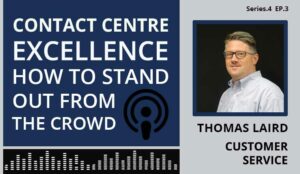Josh O’Farrell of Spearline explains what is meant by the acronym POLQA and how it can transform customer experience.
The term PESQ is used for measuring audio quality that takes into account parameters like variable delays, noise on the line, and clipping of audio.
Many audio-testing solutions in contact centres use PESQ to let you test your business-critical contact numbers using in-country points of presence in over 70 countries worldwide.
While similar to PESQ, POLQA (Perceptual Objective Listening Quality Analysis) actually provides a ‘full reference’ (FR) algorithm that compares the output of a test with an original reference signal to produce an objective measure of the difference between the two.
POLQA Explained
POLQA is the successor of PESQ – it works in a similar way but can handle higher bandwidth audio signals including super-wideband (HD) and full-band voice signals, as well as the most recent voice coding and VoIP/VoLTE transmission technologies.
POLQA can handle effects caused by new voice services like stretching and compression of speech signals in the time domain.
POLQA improves the quality prediction for new and old codecs and allows the direct comparison of adaptive multi-rate (AMR) and enhanced variable rate codec (EVRC) measures.
POLQA combines an excellent psychoacoustic and cognitive model with a new time-alignment algorithm that perfectly handles varying delays.
What Measures Are Recommended?
The measures available to you depend on the bandwidth of the voice signal you are using:

Options Explained
In all fields of subjective testing and perceptual measurement, Mean Opinion Score (MOS) scales are widely used to report the results. MOS scales are defined in the ITU recommendations P.800, BS.1116, BS.1534, and others.
A MOS scale simply defines a well-specified range of numbers that describe the quality as it is assessed by human subjects.
A general misconception is, however, that these scales are something absolute and context-free. In reality, quite the opposite is the case.
There is no such thing as an absolute MOS scale. MOS values are only valid within the context of the experiment that was conducted to generate them.
Because of the subjective and assumptive nature of MOS, as well as its inability to take into account what’s happening outside of your internal network, we would never recommend MOS as an accurate measure of audio quality.
As the majority of voice calls made are over public service telephone networks (PSTN) and mobile (which use narrowband codecs), we use PESQ in the vast majority of our audio quality testing.
This is recommended because it measures a real audio sample, allows for an end-to-end assessment of the full audio path (looking at audio sharpness, background noise, loss in volume, and clipping), and produces an objective measure based on this.
In most cases, as long as you’re not using wideband and HD voice, PESQ has no significant downside compared to POLQA.

Josh O’Farrell
Where you are using wideband or HD voice, POLQA is the best way to measure audio quality. Like PESQ, it measures a real audio sample, allows for end-to-end assessment, and produces an objective measure, with the added flexibility that it can be used for HD and wideband frequencies.
It’s a measure we’re beginning to introduce as we find more of our customers using wideband and HD voice, but there’s no significant advantage to using it otherwise.
If you’re using a standard narrowband voice, then PESQ is still your best option.
For more from Spearline and their contact centre solution, visit: www.spearline.com
Author: Guest Author
Published On: 13th Nov 2020 - Last modified: 25th Jan 2023
Read more about - Guest Blogs, Spearline



































